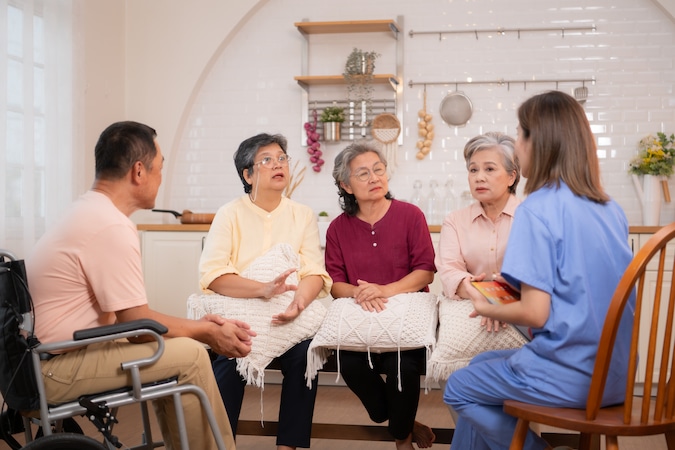
Find Local Support Groups and Community Organizations

Support groups and community organizations offer essential resources for managing health conditions. Whether you’re dealing with chronic illness, mental health challenges, or substance abuse, these groups provide emotional support, practical advice, and valuable connections to healthcare services like those offered by SelfGood .
Navigating the complexities of a health condition can be overwhelming. Thankfully, local support groups and community organizations are available to help. These groups offer resources to individuals and caregivers, ensuring that no one has to face their challenges alone. This article explores the importance of these groups and provides a guide to finding the right one for your needs.
Key Takeaways:
- Support groups provide emotional, mental, and practical help for those dealing with health conditions.
- Community organizations connect individuals with local resources and healthcare services.
- There are specialized support groups for mental health, chronic illnesses, caregivers, and more.
- Local and online directories can help you find groups in your area.
What Are Support Groups and Community Organizations?

Support groups are gatherings of individuals facing similar health challenges, providing emotional and mental support through shared experiences. These groups may meet in person or virtually and can be led by peers or professionals. Support groups help participants build a sense of community, offering a safe space to share struggles, gain advice, and develop coping strategies.
Community organizations, on the other hand, are entities that offer resources such as counseling, educational programs, and healthcare services. They work to address the broader needs of individuals in their communities, often collaborating with local healthcare providers to create comprehensive support systems.
Why Are Local Support Groups Crucial?
Local support groups offer personalized care by connecting individuals with others in their community who share similar experiences. These groups provide emotional relief, reduce feelings of isolation, and help members build a network of people who understand their struggles. Additionally, in-person meetings foster deeper connections that are often more impactful than virtual interactions.
Community organizations ensure that individuals have access to a wide range of resources, from financial aid to healthcare services, often tailored to specific health conditions.
Mental Health Support Groups
Mental health support groups are designed for individuals struggling with conditions like anxiety, depression, PTSD, and other mental health challenges. These groups provide an open space for members to discuss their experiences, share coping strategies, and receive emotional support.
Local Mental Health Organizations:
- NAMI (National Alliance on Mental Illness):NAMI offers local peer-led support groups focused on mental health recovery.
- Mental Health America (MHA):MHA connects individuals to local mental health resources, including support groups and educational services.
Resources from Community Organizations:Community organizations often offer free or low-cost mental health services, such as counseling sessions and group therapy, to ensure accessibility for all individuals in need.
Chronic Illness Support Groups
For individuals living with chronic illnesses like diabetes, cancer, or autoimmune diseases, support groups offer a lifeline. They provide a space to discuss symptoms, treatment experiences, and daily challenges. Chronic illness support groups not only offer emotional comfort but also practical advice on disease management and self-care.
Local Chronic Illness Organizations:
- American Diabetes Association:This organization offers local support groups focused on diabetes management and education.
- Cancer Support Community:With chapters nationwide, this organization provides cancer patients and their families with group therapy, workshops, and access to healthcare services.
Testimonial:“I’ve learned so much from my diabetes support group. The shared stories and encouragement have empowered me to take control of my health.” — Sarah, support group participant.
Support for Caregivers
Caregivers often face high levels of stress and emotional exhaustion while caring for loved ones with chronic or terminal conditions. Support groups for caregivers provide a safe space where they can share their challenges, receive emotional support, and gain practical advice from others who understand their situation.
Local Caregiver Resources:
- Caregiver Action Network:This organization offers support groups and resources for caregivers to cope with the stresses of caregiving.
- Family Caregiver Alliance:Provides support and educational resources for family caregivers, including local support groups and workshops.
Community Organizations Offering Resources for Specific Health Conditions
Cancer Support Groups
Cancer-specific support groups provide individuals with an opportunity to connect with others facing similar challenges. These groups often focus on particular types of cancer, offering specialized guidance and emotional support.
Local Cancer Support Resources:
- American Cancer Society:Provides financial aid, treatment support, and local support groups for individuals with cancer.
- Gilda’s Club:Offers emotional support and workshops for cancer patients and their families across the U.S.
Substance Abuse Support Groups
Substance abuse recovery requires ongoing peer support, making groups like Alcoholics Anonymous (AA) and Narcotics Anonymous (NA) vital for those on the road to recovery. These groups help members stay accountable and provide a strong support network during difficult times.
Local Substance Abuse Resources:
- Alcoholics Anonymous (AA):Offers both in-person and virtual meetings for individuals seeking sobriety support.
- Narcotics Anonymous (NA):Provides support meetings for those recovering from drug addiction.
Parenting and Child Health Support Groups
Parents of children with health challenges can benefit greatly from joining parenting support groups. These groups provide resources and emotional support for navigating pediatric health concerns and developmental challenges.
Local Parenting Resources:
- La Leche League:Offers local support for breastfeeding mothers, including peer mentoring and educational workshops.
- Early Intervention Services:Provides services for parents of children with developmental delays, including support groups and pediatric care.
How to Find and Join Support Groups in Your Area

Using Online Resources
Many organizations offer online directories that make it easy to find local support groups. Websites like NAMI and the American Cancer Society provide searchable databases of support group meetings across the country.
Tips for Verifying Group Legitimacy:
- Ensure the group is associated with a reputable national organization.
- Look for testimonials or reviews from current members.
- Check the credentials of facilitators for groups focused on mental health or chronic illness.
Community Centers and Hospitals
Local hospitals and community centers often host support groups for specific health conditions. Hospitals may run support groups for patients with conditions like cancer, diabetes, or heart disease, often led by healthcare professionals.
Virtual Support Group Options
If attending in-person meetings is not feasible, many local groups now offer virtual options. Hybrid meetings—where participants can join in person or online—are becoming increasingly common, allowing greater flexibility.
Final Thoughts
Local support groups and community organizations provide invaluable assistance to individuals and caregivers facing health challenges. These groups offer a safe space for emotional support, practical advice, and access to healthcare resources. Whether you’re managing a chronic illness or supporting a loved one, joining a local support group can help you feel less alone on your journey to better health.
Frequently Asked Questions
What Are the Benefits of Joining a Support Group?
Support groups provide emotional, mental, and social benefits by connecting individuals with others who share similar experiences. Group members can exchange practical advice, coping strategies, and moral support.
How Do I Know If a Support Group Is Right for Me?
Attend a few sessions to see if you feel comfortable and supported. If you connect with the group and find the discussions helpful, it’s likely the right fit for you.
Can I Join a Virtual Support Group Instead of Attending In-Person?
Yes, many local groups now offer hybrid or fully virtual options, allowing individuals to participate from the comfort of their home while still receiving valuable support.
Sources:
- National Alliance on Mental Illness. (n.d.). Mental Health Support Resources from NAMI. Retrieved from https://nami.org
- American Cancer Society. (n.d.). Find Local Cancer Support Resources. Retrieved from https://cancer.org
- Substance Abuse and Mental Health Services Administration. (n.d.). Resources for Substance Abuse Recovery. Retrieved from https://samhsa.gov




